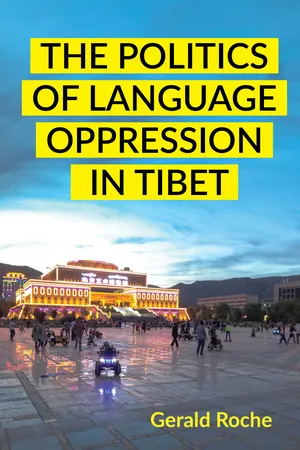
- 252 pages
- English
- ePUB (mobile friendly)
- Available on iOS & Android
The Politics of Language Oppression in Tibet
About this book
In The Politics of Language Oppression in Tibet, Gerald Roche sheds light on a global crisis of linguistic diversity that will see at least half of the world's languages disappear this century.
Roche explores the erosion of linguistic diversity through a study of a community on the northeastern Tibetan Plateau in the People's Republic of China. Manegacha is but one of the sixty minority languages in Tibet and is spoken by about 8,000 people who are otherwise mostly indistinguishable from the Tibetan communities surrounding them. Recently, many in these communities have switched to speaking Tibetan, and Manegacha faces an uncertain future.
The author uses the Manegacha case to show how linguistic diversity across Tibet is collapsing under assimilatory state policies. He looks at how global advocacy networks inadequately acknowledge this issue, highlighting the complex politics of language in an inter-connected world. The Politics of Language Oppression in Tibet broadens our understanding of Tibet and China, the crisis of global linguistic diversity, and the radical changes needed to address this crisis.
Frequently asked questions
- Essential is ideal for learners and professionals who enjoy exploring a wide range of subjects. Access the Essential Library with 800,000+ trusted titles and best-sellers across business, personal growth, and the humanities. Includes unlimited reading time and Standard Read Aloud voice.
- Complete: Perfect for advanced learners and researchers needing full, unrestricted access. Unlock 1.4M+ books across hundreds of subjects, including academic and specialized titles. The Complete Plan also includes advanced features like Premium Read Aloud and Research Assistant.
Please note we cannot support devices running on iOS 13 and Android 7 or earlier. Learn more about using the app.
Information
Table of contents
- Acknowledgments
- List of Abbreviations
- Note on Transliteration
- Introduction
- Part 1: Erasure
- Part 2: Suppression
- Part 3: Elimination
- Conclusion
- Epilogue
- Notes
- References
- Index